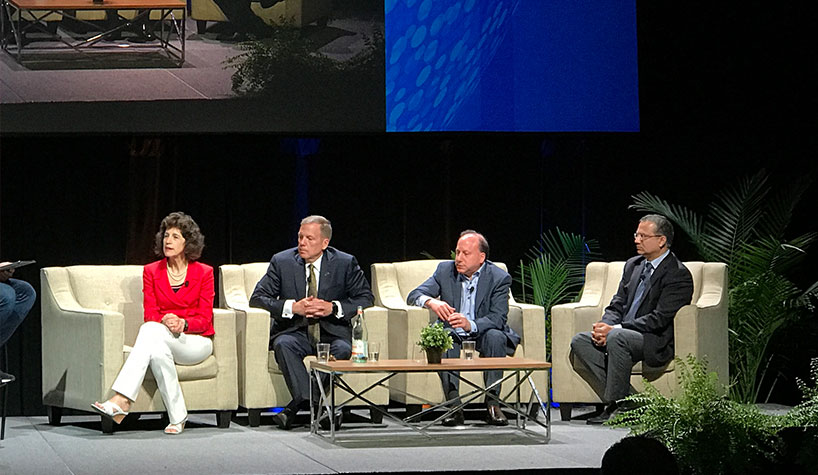HOUSTON—Technology is at a crossroads in the hospitality industry. While brands are trying to connect the dots and patch up areas of disconnect, they’re also trying to bring in new, advanced guest experiences. The challenge comes from integrating these innovations into legacy properties, which may have more outdated technology in place, making the shift costly. But one aspect that holds true across all properties is a strategy of consistency in experience, which was discussed at this year’s HITEC Houston.
During the “Technology and the power of the C-Suite” general session, a panel of top-level executives gave possible solutions to this challenge, as well as hopeful insights. While there was some opposition about how exactly to overcome technology’s transformations, all agreed that it could either make or break the guest experience, depending on its functionality—whether or not this technology works properly.
Ash Kapur, SVP of hotel asset management and CRO for Starwood Capital Group, stressed the importance of having a brand vision and a set strategy for long-term goals. “I see a lot of Band-Aids; I see a lot of things broken. What bothers me is that there is not a single approach today in technology,” he said. “The hospitality space is extremely myopic.”
Mark Carrier, president of B.F. Saul Company Hospitality Group, agreed, but recognized that while a disjointed strategy may obstruct a cohesive guest experience among properties, it presents new possibilities. “Rather than an integrated technology approach for brand companies, it ends up patched together. Not being fully integrated creates opportunity for innovative, faster moving companies,” he said.
Others weighed in, noting how guest experience plays into this strategy. Cindy Estis Green, CEO of Kalibri Labs, mentioned that it wasn’t always about guest-facing products. With technology being tactical in the early days, very little emphasis was put on the guest journey, but now, it’s taking center stage. “Now it’s part of the brand definition. You can build technology around exactly what you want the brand to deliver,” she said. “To do technology because it’s cool doesn’t make it. To do technology that actually becomes seamless in the guest experience is the magical part.”
A consistent brand strategy has to encompass functioning technology for a frictionless guest experience. According to Barry Goldstein, EVP and chief commercial officer for Wyndham Hotels & Resorts, hotels have very few chances to get this right. Goldstein said that once a hotel presents guests with a product that simply doesn’t work, the guest no longer wants to interact.
He also spoke on some other challenges that inhibit a smooth experience—namely, the diversity of guests. “We have someone walk into our hotel and [guests] span from five generations. We have to solve for everything,” he said. For Goldstein, this means offering both digitally capable and classically customer-focused products that target specific guests based on their needs.
Along with these internal challenges brands are facing, there is also always the concern of privacy, which can be the ultimate hindrance to an enjoyable guest experience. Estis Green acknowledged this, but was confident that a satisfied guest will always present a hotel with his or her personal information, as long as they can see its benefit.
“Why did we all agree to give Facebook our information? Because it was convenient and easy, and we got a benefit from doing it,” she said. “Once the guest knows they get a benefit because good things happen, they get checked in ahead of time, or want information about the market they’re going to, then they’re going to say yes all day long.”
The panelists all agreed that a loyal guest is the cornerstone to a successful brand, and while the digital needs and expectations of the guest may be changing, it all goes back to service.
“If I’m consistent in my service every time and technology helps me enable that every time, I will own the guest,” Kapur said. “Consistent experiences at hotels—those brand moments are easily identifiable.”
